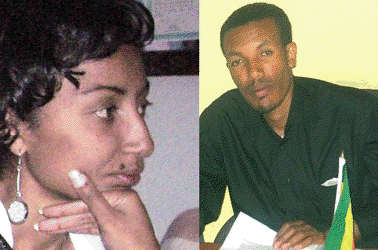Ethiopia’s Anti-Terrorism Law Used to Target Journalists
The current Ethiopian government’s labeling of terrorists and terrorist activities is broad. The definition stretches to cover any political opposition to the ruling party of Prime Minister Meles Zenawi and includes the Ogadon National Liberation Front (ONLF), a group seeking independence from Ethiopia. Journalists who report on these groups or directly criticize the government face arrest and imprisonment. Those arrested have been held incommunicado.
Ethiopia’s anti-terrorism law, passed in 2009, criminalizes any reporting that authorities believe “encourages” or “provides moral support” to groups or causes that the government has labeled terrorist. The law also makes it difficult for the press to report on any subject matter critical of the current government. In September alone, five Ethiopian and two Swedish journalists were charged with committing “terrorist activities.”

Photograher Persson and reporter Schibbye were arrestedin July with several members of the 'ONLF'.Photos: Kontinent
On September 6th Johan Persson and Martin Schibbye of the Swedish news agency ‘Kontinent’ were tried in an Addis-Abbaba court. They were arrested in July after having entered the country to investigate human rights abuses with members of the ONLF, a group strictly off-limits in the Ethiopian press. According to the news agency ‘Bloomberg’, a government spokesman said that as well as “terrorist activities,” the two men were also accused of “supporting terrorists and providing them with professional aid” and “entering a sovereign country without a valid visa or legal authorization.”
On the same day that Persson and Schibbye were tried, charges were brought against three Ethiopian journalists: Wubeshet Taye, the deputy editor of the weekly Awramba Times, and Reyot Alemu, a columnist for the Amharic-language weekly Fitih. The third journalist, Elias Kifle, who now lives in the United States, was charged in absentia. They were formally charged in a federal court under Ethiopia’s anti-terrorism law and face the possibility of life imprisonment.
According to the ‘Committee to Protect Journalists’ a fourth reporter, Sileshi Hagos, who was a contributor to Addis Ababa-based radio station 96.3 FM and was managing director of the now-defunct political magazine ‘Change’ was arrested by security forces on September 9th. Hagos‘, whose laptop was confiscated, had published articles about ‘Ginbot 7’ the political party of exiled opposition leader Berhanu Nega. Nega was labeled a terrorist after the 2009 law was passed.
‘Reporters Without Borders’ also reported that opposition leader, blogger and former journalist Eskinder Nega was arrested with four other opposition politicians on September 21st. Eskinder Nega and his colleagues have been accused of “preparing terrorist attacks” and for having links to ‘Ginbot 7‘. In an interview with ‘Agence France-Presse’, government spokesman Shimelis Kemal accused the journalists, and the activists detained with them, of plotting “a series of terrorist acts that would likely wreak havoc.”
All of these journalists remain in prison, awaiting sentencing. ‘Reporters Without Borders’ wrote to Prime Minister Zelawi on August 25th voicing concern for the health and safety of the individuals being held and called for their immediate release.







One Comment on "Ethiopia’s Anti-Terrorism Law Used to Target Journalists"
Trackbacks for this post